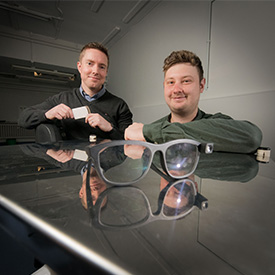-
Study
Study
Interested in studying at Northumbria? With 31,500 students, Northumbria is one of the largest universities in the country, offering courses on either a full-time, part-time or distance learning basis.
Discover more-
Undergraduate
- Undergraduate Study Degree
- Undergraduate Open Day & Events
- Application Guides
- Northumbria University UCAS Exhibitions
- Foundation Years
- Undergraduate Fees & Funding
- School & College Outreach
- Continuing Professional Development
-
Postgraduate
- Postgraduate Study Degree
- Postgraduate Research Degrees
- Postgraduate Open Days and Events
- Postgraduate Fees & Funding
- Flexible Learning
- Thinking about a Masters?
- Continuing Professional Development
- Change Direction
-
Student Life
- The Hub - Student Blog
- Accommodation
- Life in Newcastle
- Support for Students
- Careers
- Information for Parents
- Students' Union
- Northumbria Sport
-
-
International
International
Northumbria’s global footprint touches every continent across the world, through our global partnerships across 17 institutions in 10 countries, to our 277,000 strong alumni community and 150 recruitment partners – we prepare our students for the challenges of tomorrow. Discover more about how to join Northumbria’s global family or our partnerships.
Discover more-
Applying to Northumbria
- European Union
- Our London Campus
- Northumbria Pathway
- International Events
- Entry Requirements
- Agent Network
-
Northumbria Language Centre
- Faculty Requirements
- Acceptable English Requirements
- Pre-Sessional English and Study Skills
- Academic Language Skills Programmes (ALS)
-
International Fees, Funding & Scholarships
- International Undergraduate Fees
- International Undergraduate Funding
- International Masters Fees
- International Masters Funding
- International Postgraduate Research Fees
- International Postgraduate Research Funding
- International Money Matters
-
Life at Northumbria
- International student support
- The Hub - Student Blog
- Careers
-
International Mobility
- Current Northumbria Students
- Incoming Exchange Students
-
-
Business
Business
The world is changing faster than ever before. The future is there to be won by organisations who find ways to turn today's possibilities into tomorrows competitive edge. In a connected world, collaboration can be the key to success.
Discover more -
Research
Research
Northumbria is a research-rich, business-focused, professional university with a global reputation for academic quality. We conduct ground-breaking research that is responsive to the science & technology, health & well being, economic and social and arts & cultural needs for the communities
Discover more -
About Us
-
About Northumbria
- Our Strategy
- Our Staff
- Our Partners
- Student Profiles
- Alumni Profiles
- Leadership & Governance
- Academic Departments
- University Services
- History of Northumbria
- Contact us
- Online Shop
-
-
Alumni
Alumni
Northumbria University is renowned for the calibre of its business-ready graduates. Our alumni network has over 236,000 graduates based in 178 countries worldwide in a range of sectors, our alumni are making a real impact on the world.
Discover more - Work For Us
What will I learn on this module?
This is a project-oriented design-based learning module, which introduces you to the fundamental concepts of energy systems. The underlying electrical engineering, physics and mathematics is illustrated using examples from electricity generation, transmission, distribution, consumption and storage. Ficus is given to develop unique design skills over a wide range of scenarios.
Basics of Electrical and Electronic Engineering
Voltage, current, power and energy. Conservation of energy. Basic electromagnetism. Electric charge: conductors, insulators and semiconductors. Electric field. Electrostatic potential energy and potential. Magnetic field and magnetic flux density. Electromagnetic induction: Faraday’s law and Lenz’s law. Electric generator. Electric and Magnetic Circuits. Basics of electric motors and generators.
Three phase power and power electronic devices
Production of three-phase power. Phase and line voltages and currents in star and delta systems. Measurements of three-phase power. Introduction to single-phase transformer: principle, construction, referring of impedances, losses and efficiency, and equivalent circuit. Transformer Connections (Autotransformers and three-phase transformers). Overview of power electronics: Rectifiers and inverters for renewable energy integration
Power generation, energy efficiency and energy storage
Overview of conventional power generation system: gas and coal-fired power stations, combined heat and power, IGCC, nuclear power. Load curve and load factor. Fundamentals of power transmission and distribution. Load, Fundamentals of wind energy and solar energy conversion systems. Energy storage technologies
How will I learn on this module?
Since this is a project-oriented design-based learning module, a range of learning and teaching approaches are used. You will be learning about how to complete a project for designing a basic energy systems through lectures, seminars and laboratory activities. Lectures are used to explain fundamental physical and engineering principles in addition to the underlying mathematics. Seminars are used to cover a range of example design problems, which are heavily used to illustrate key design concepts and develop valuable problem-solving abilities. These examples become increasingly relevant to practical applications as the module progresses. During the first seven weeks of the laboratory sessions, you will work in small groups (minimum 3 and maximum 5 students per group) to validate different components of the energy system before putting all these together to complete the project over the remaining five weeks. You will also have the opportunity to work in a group with specific individual roles related to the project activities. You will receive both formative and summative feedback during lectures, seminars and laboratory sessions.
How will I be supported academically on this module?
In addition to lectures and seminars, you are encouraged to discuss specific academic matters with the module team which operates an open-door policy. Laboratory sessions also provide an informal environment in which you can engage with the module team individually or in small groups. Laboratory work typically occurs in small groups and you have the opportunity to benefit from discussions with your peers in addition to the module team.
Throughout the module, you will gain practical skills which are essential for subsequent levels and future work in the energy industry.
What will I be expected to read on this module?
All modules at Northumbria include a range of reading materials that students are expected to engage with. The reading list for this module can be found at: http://readinglists.northumbria.ac.uk
(Reading List service online guide for academic staff this containing contact details for the Reading List team – http://library.northumbria.ac.uk/readinglists)
What will I be expected to achieve?
Knowledge & Understanding:
1. Demonstrate a broader understanding of the concepts related to energy systems (AHEP4, C1)
2. Knowledge and understanding of mathematical principles applied in energy systems (AHEP4, C1)
3. Describe the underlying principles which govern the operation of major energy generation technologies in industry (AHEP4, C3)
Intellectual / Professional skills & abilities:
4. Solve design problems and validate these in labs to complete the design of a basic and complete energy system (AHEP4, C6, C13, M6, M13)
Personal Values Attributes (Global / Cultural awareness, Ethics, Curiosity) (PVA):
5. Understanding of the need for a high level of professional and ethical conduct while working in a group to achieve a common goal AHEP4, C11, M11)
How will I be assessed?
SUMMATIVE
1. Part A - Coursework (CW) Final Report based on Design Problem Solving Tasks (70%) – LO2, LO4, LO5
2. Practical (PRE) Project Validation (30%) – LO1, LO3,
FORMATIVE
1. Lectures - LO1, LO2, LO3
2. Seminars- LO4, LO5
The coursework component is a group report worth 70% of the module. Within this report each team member needs to provide a review of their contribution to the team. The individual contribution will be count towards 60% of this component.
The second component is a group presentation worth 30% of the module, in which each team member must present their individual contribution to the team, with 60% of the marks obtained for individual contribution to the presentation and 40% coming from the overall group presentation.
The design problem solving tasks are mainly based on different themes within the project, while the practical project validation requires you to fully justify the design. Final report needs to incorporate the findings from the theoretical design and practical validations.
Ongoing feedback will be provided during the scheduled weekly activities, which will assist you to improve your level of understanding
Pre-requisite(s)
N/A
Co-requisite(s)
N/A
Module abstract
Energy is an integrated part of the society and the development of the modern society highly relies on the energy. There have been ongoing concerns on the effective management and utilisation of energy from different sources, as the energy prices are consistently increasing. The challenges are also arising from the integration of intermittent renewable energy sources, which are crucial to achieve net zero emissions. Electrical and electronic engineers play a very important role to ensure the cost-effective operation and management of energy systems. In this module, you will have the opportunity to gain fundamental technical knowledge on different aspects of energy system, including the associated physical and mathematical principles. You will also develop skills to design simple energy systems by considering different operating scenarios. You will be able to validate the principles and designs in the lab, which will also provide you hands-on experience and assist you to build confidence for working in the energy industry.
Course info
UCAS Code H605
Credits 20
Level of Study Undergraduate
Mode of Study 4 years full-time or 5 years with a placement (sandwich)/study abroad
Department Mathematics, Physics and Electrical Engineering
Location City Campus, Northumbria University
City Newcastle
Start September 2024 or September 2025
All information is accurate at the time of sharing.
Full time Courses are primarily delivered via on-campus face to face learning but could include elements of online learning. Most courses run as planned and as promoted on our website and via our marketing materials, but if there are any substantial changes (as determined by the Competition and Markets Authority) to a course or there is the potential that course may be withdrawn, we will notify all affected applicants as soon as possible with advice and guidance regarding their options. It is also important to be aware that optional modules listed on course pages may be subject to change depending on uptake numbers each year.
Contact time is subject to increase or decrease in line with possible restrictions imposed by the government or the University in the interest of maintaining the health and safety and wellbeing of students, staff, and visitors if this is deemed necessary in future.
Your Learning Experience
Find out about our distinctive approach at
www.northumbria.ac.uk/exp
Admissions Terms and Conditions
northumbria.ac.uk/terms
Fees and Funding
northumbria.ac.uk/fees
Admissions Policy
northumbria.ac.uk/adpolicy
Admissions Complaints Policy
northumbria.ac.uk/complaints













